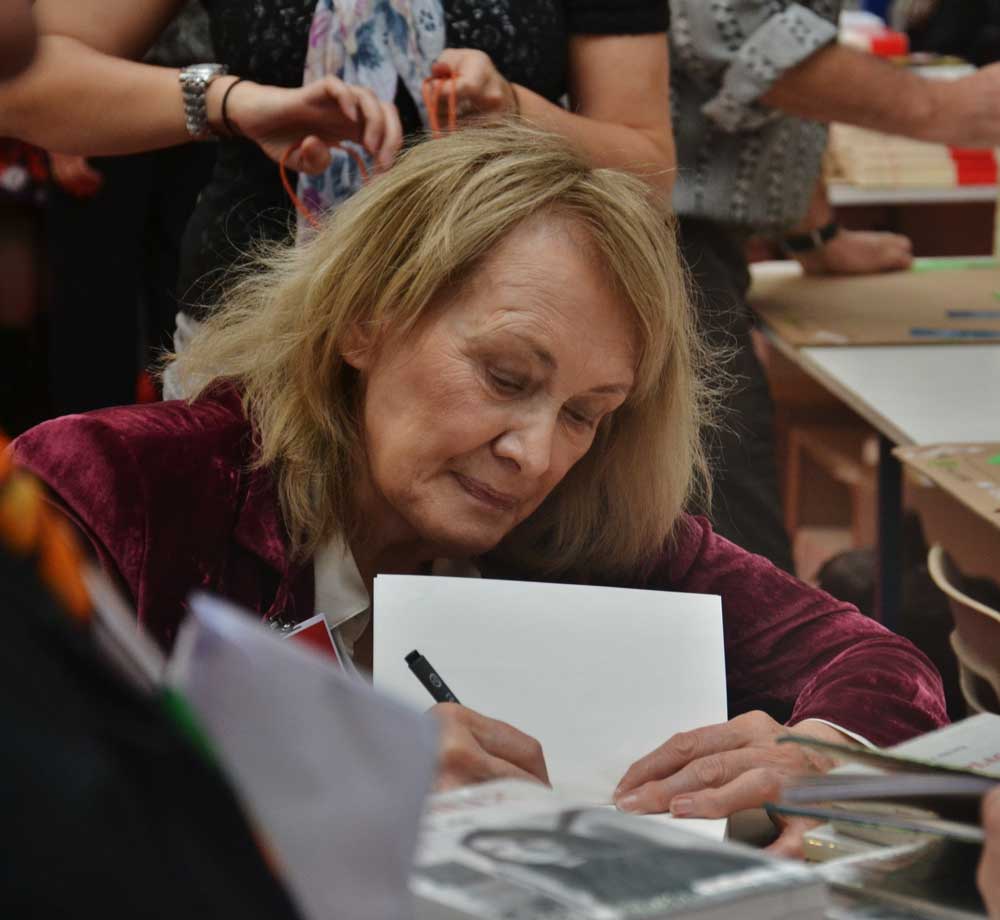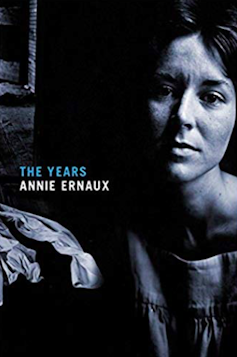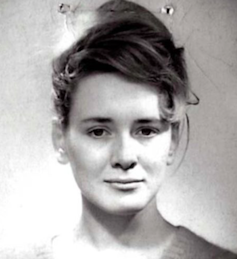
By Siobhán McIlvanney
The French author Annie Ernaux has won the 2022 Nobel prize in literature at the age of 82. Of the 119 awarded, Ernaux is only the 18th woman Nobel laureate in literature and the first French woman to have won the prize.
The academy praised her “for the courage and clinical acuity with which she uncovers the roots, estrangements and collective restraints of personal memory”.
From her first book Cleaned Out in 1973, Ernaux’s work has been closely informed by her own life experiences. She has continued to surprise and inspire readers with coverage of daring topics and her innovative approach to genres. Her body of work includes discussions on the act and art of writing, texts incorporating personal photographs, intimate and public diaries, and life-writing that refuses to be contained by categories.
Class conflict
Born in 1940, Ernaux was brought up in Yvetôt in Normandy. She is the only daughter of working-class parents who ran a cafe-cum-grocers, and her childhood was underpinned by class tensions within the family home and outside it. Ernaux attended a private Catholic girls’ school for her secondary education, which fuelled social divisions between her and her parents – in particular her father, which she explores in her fourth publication A Man’s Place.
Growing up in a socially divided environment meant Ernaux felt ashamed of the supposedly distasteful aspects of her upbringing, such as the working-class environment of her father’s cafe or her mother’s shirking of the norms of middle-class housewifery and femininity, which she writes about in A Frozen Woman.
Her childhood was immersed in working-class culture, popular songs and the romantic novels her mother consumed. But from an early age, she was also an avid reader of “classic” French texts. She then studied literature at Rouen university and went on to teach it at secondary school before becoming a full-time writer in the 1970s. This experience gave Ernaux knowledge of French theories and practices of writing, which is evident in her references to authors such as Honore de Balzac, Marcel Proust and Simone de Beauvoir and her self-reflexive comments on the act of writing.
6
As a writer, she realised that her daily life was not represented in either the French literature she read at home or in the classrooms she learnt and later taught in. It was at school that she became aware of a “familiarity, a subtle complicity” as her teachers avidly listened to the stories of her middle-class schoolmates but silenced her attempts to speak about her home life. These experiences permeate her work, which repeatedly touches on the conflict between what she calls “the dominant class” and “the dominated class”, referencing the French sociologist Pierre Bourdieu.
Her first three novels, Cleaned Out, Do What They Say or Else and A Frozen Woman, form a trilogy of autobiographical novels. These works broadly detail the socialisation of a working-class girl who has a middle-class education and then marriage. Her protagonist is a woman who, like so many of Ernaux’s readers, identifies as a “class defector”.
In subsequent works, Ernaux considered fictionalised accounts of her origins a form of betrayal because they ran the risk of exoticising her family and class origins.
Ernaux’s acute awareness of the formative influence of class underpins her entire body of work and in the wake of her win, many in France praised her work for its ongoing focus on the French working-class experience.
Flat writing
Following this trilogy, Ernaux adopted the writing style for which she has since become well-known, typically referred to as “l’écriture plate” (literally “flat writing”). This pared-down, understated style is coupled with a fluid approach to genre that incorporates elements of ethnography, autobiography and sociology. As she comments in A Man’s Place:
This neutral way of writing comes to me naturally, it is the very same style I used when I wrote home telling my parents the latest news.
The chairman of the Nobel Literature committee, Anders Olssen, described Ernaux’s work as “uncompromising and written in plain language, scraped clean”.
This approach to writing is underpinned by a mission. Ernaux believes that writing about the self inevitably involves writing about a socio-political context, and thereby extends the representativeness of her own experience. By writing simply about her own experiences, she also wants to write into literature the experience of French working-class.
That desire to give voice to marginalised experiences is further illustrated in two of her “external diaries”, Exteriors and Things Seen, which record the everyday exchanges of people in outside spaces such as the supermarket or when commuting on the Paris metro.
She has also published more intimate diaries composed during significant stages of her life. I Remain in Darkness was written during her mother’s decline from Alzheimer’s. Getting Lost is a diary she kept during a passionate affair with a married man – a love affair she also described in her novel Simple Passion. The honesty with which she details her obsession with this man struck a chord with many of her female readers.
Her literary approach typically incorporates self-reflexive remarks where she comments on the challenges she faces in turning lived experiences into literary form.
It is that openness and sense of writer-reader intimacy that partly explains her popularity. Her courage in exploring and exploding generic expectations is also reflected in the content of her work. She writes about a range of taboo subjects including her backstreet abortion (Cleaned Out and Happening, which was recently made into a film), sexual intimacy and issues of consent, breast cancer and her dead sister (L’Autre Fille).
Her most famous work, The Years, is considered to be her magnum opus. It can be read as a further example of a “public diary” in that it covers the socio-cultural history of France, mixing her own story (relayed through the representative “she”) with the collective story of her generation. Nominated for the International Booker Prize in 2019, The Years made English-speaking audiences aware of her – and that attention has now happily been extended by the jury of the Nobel prize in literature.
Like many of the women prizewinners who have preceded her, including Toni Morrison and Alice Munro, Ernaux has spent her writing life giving voice to the experiences of those who remain under- or unrepresented in literature. This award will allow these voices to ring out all the more clearly.![]()
![]()
Siobhán McIlvanney is Professor in French and Francophone Women’s Writing; Head of Department of French, King’s College, London.
L’œuvre d’Annie Ernaux à l’heure de la reconnaissance internationale
Elise Hugueny-Léger
Annie Ernaux, autrice de la mémoire personnelle et collective, dont le travail mêle finement littérature autobiographique et observations sociologiques, a reçu le prix Nobel de littérature ce 6 octobre 2022.
Ernaux a publié son premier roman, Les armoires vides, en 1974. Elle y fait le récit fictionnalisé de son avortement illégal en 1964, à l’époque où, encore étudiante, elle s’éloignait progressivement de son milieu d’origine – une famille populaire de Normandie, avec des parents d’abord ouvriers, puis commerçants. Et même 25 ans après la publication du Deuxième sexe de Beauvoir, la société française était encore pétrie de jugements moraux et d’hypocrisie au sujet des droits des femmes en matière de reproduction. Avec Les armoires vides, Ernaux offrait un miroir aux nombreuses femmes issues d’un milieu populaire qui avaient dû recourir à des avortements clandestins, encourant un danger de mort.
Avec son style d’une grande sobriété (qu’elle qualifie elle-même d’« écriture plate »), Annie Ernaux a l’image d’une écrivaine intransigeante et honnête. Dans les années 1980 et 1990, elle s’impose grâce à des ouvrages autobiographiques tels que La place, où elle raconte la vie de son père ; ce livre lui vaut le Prix Renaudot en 1984. Elle est aujourd’hui considérée comme une autrice importante et ses textes sont largement enseignés dans les écoles et les universités.
Annie Ernaux est restée longtemps inconnue du grand public dans la plupart des pays anglophones – ses textes sont traduits depuis longtemps aux États-Unis, et sont étudiés depuis les années 1980-90 dans le monde universitaire anglophone. Mais cette injustice est en passe d’être réparée, grâce à la traduction récente de deux de ses œuvres majeures : Les années, une « autobiographie collective » couvrant six décennies d’histoire personnelle et sociale, en lice pour prix international Man Booker ; et L’événement, dans lequel Ernaux revient sur le sujet de l’avortement illégal, mais cette fois-ci sous forme d’autobiographie.
Femmes et société
Par son contenu ambitieux et sa forme narrative originale, Les années a été salué de façon quasi unanime au moment de sa publication. Le livre se situe à la jonction de l’autobiographie, de la sociologie et de la mémoire collective, utilisant alternativement les pronoms « elle » ou « nous » plutôt que « moi » pour souligner les profonds changements socioculturels dont l’écrivain a été le témoin depuis son enfance dans les années 1940 jusqu’à la fin du XXe siècle.

Pour retracer l’inéluctable passage du temps, Les années puise dans des dictons, des chansons, des publicités, des objets iconiques, des événements historiques et des anecdotes personnelles. Ce faisant, le livre raconte l’évolution de la place des femmes dans la société française et leur lutte pour la liberté sexuelle et l’indépendance.
Les médias français ont réagi avec moins d’enthousiasme à la parution de L’événement, en 2000, qui traite de la situation de l’avortement et de ses conséquences avant sa légalisation en 1975. Certains critiques n’étaient manifestement pas à l’aise avec le sujet ni avec le style brut de l’écriture dont témoigne le passage suivant, qui décrit la faiseuse d’anges :
Je suis parvenue à l’image de la chambre. Elle excède l’analyse. Je ne peux que m’immerger en elle. Il me semble que cette femme qui s’active entre mes jambes, qui introduit le spéculum, me fait naître. J’ai tué ma mère en moi à ce moment-là.
Avec ce livre, Annie Ernaux a souhaité lever le voile sur ce que les lois sur l’avortement signifiaient en pratique, ce qui n’était jusqu’alors exprimé que par le non-dit :
Si beaucoup de romans évoquaient un avortement, ils ne fournissaient pas de détails sur la façon dont cela s’était exactement passé. Entre le moment où la fille se découvrait enceinte et celui où elle ne l’était plus, il y avait une ellipse.
L’événement rompt ce silence : avec précision mais sans pathos, Ernaux y détaille l’atmosphère conservatrice qui régnait dans la France des années 1960, toute en jugements moraux, et son propre désespoir, sa solitude tandis qu’elle cherchait une solution à une époque où le mot même d’avortement n’avait « pas de place dans le langage ». Elle y raconte les conditions épouvantables de son avortement – après avoir finalement trouvé une faiseuse d’anges, elle a fait une fausse-couche dans sa résidence étudiante et a failli mourir suite à une hémorragie.

Inventoire
L’événement n’est pas seulement le récit de cette expérience personnelle, physiquement et psychologiquement traumatisante. Il y est aussi question du sens de cet événement. Annie Ernaux explore les réactions des hommes qui l’entourent, dans le contexte de son époque et sa condition sociale.
Les étudiants de son entourage y sont dépeints comme fascinés par son « état » de femme enceinte, et certains tentent même de profiter que « le mal est déjà fait » pour tenter de coucher avec elle. À l’hôpital, Ernaux est humiliée par un jeune médecin qui lui lance « Je ne suis pas plombier », avant de se radoucir en réalisant qu’elle est étudiante.
Aujourd’hui, L’événement est considéré comme un livre de référence sur le sujet de l’avortement. Le texte est d’ailleurs souvent cité ou mentionné lors des débats qui portent sur les lois sur l’avortement ou sur les droits des femmes. L’année dernière, par exemple, le jour du référendum sur l’avortement en Irlande, France Culture a sorti un article sur Annie Ernaux.
Écriture et mauvais goût
Annie Ernaux a admis dans le livre :
« Il se peut qu’un tel récit provoque de l’irritation, ou de la répulsion, soit taxé de mauvais goût. D’avoir vécu une chose, quelle qu’elle soit, donne le droit imprescriptible de l’écrire. Il n’y a pas de vérité inférieure. Et si je ne vais pas au bout de la relation de cette expérience, je contribue à obscurcir la réalité des femmes et je me range du côté de la domination masculine du monde. »
L’autrice a en effet écrit sur de nombreux sujets rarement abordés dans la littérature classique, y compris le sexe, la maladie, le corps vieillissant, la démence et l’alcoolisme, toujours de façon très directe. On est loin de la réminiscence proustienne – Ernaux ne s’intéresse aux souvenirs que comme preuves que les événements ont bien eu lieu.
Pour Annie Ernaux, l’acte d’écrire permet de rendre visible et sensible l’expérience vécue, en particulier celle des femmes – et surtout de ne jamais prendre leurs droits pour acquis.
Au cœur de l’œuvre d’Annie Ernaux, il y a la volonté de donner une voix à ceux qui sont réduits au silence. Dans une interview récente, elle parle de son soutien au mouvement #MeToo, mais aussi de ses affinités avec les mouvements des « gilets jaunes », qu’elle voit comme la manifestation de profondes injustices sociales et d’un mépris des élites envers la classe ouvrière et les chômeurs. Son « arrivée » dans le monde anglophone est donc particulièrement opportune… à l’âge de 78 ans.
Quand Simone Veil a disparu, en 2017, de nombreux tags « Merci Simone » ont fleuri dans les rues de Paris, saluant le rôle qu’elle a joué dans l’adoption des lois sur l’avortement en France. De même, beaucoup de lectrices et de lecteurs écrivent à Annie Ernaux pour la remercier, reconnaissant l’importance de ses écrits féministes dans leur propre parcours. Elle n’a pas volé sa place dans le club des grands écrivains français reconnus à l’international.
![]()
Elise Hugueny-Léger is Senior Lecturer at the School of Modern Languages at the University of St Andrews.





























Leave a Reply